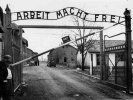Eye For Film >> Movies >> The World At War (1974) Film Review
"Down this road, on a summer day in 1944, the soldiers came. Nobody lives here now. They stayed only a few hours. When they had gone, a community which had lived for a thousand years was dead."
So begins The World At War, the definitive history of World War Two. It's a solemn beginning, narrated by Laurence Olivier, and his opening remarks are followed by Carl Davis's haunting theme tune. It doesn't take long to realise that this is going to be something very special.

The World At War was the brainchild of Thames TV producer Jeremy Isaacs, who first came up with the idea in 1970. Despite the scale of the project, his vision was simple: to tell it how it was, from the people who were there, in their own words and without judgement, or bias.
He started by asking Noble Frankland, the director of the Imperial War Museum and the programme's historical advisor, to list on a single piece of paper the 15 most decisive military campaigns of the war. Frankland made his list on the back of an envelope - Poland, the blitzkrieg in the Low Countries, the Battle of Britain, Operation Barbarossa, Stalingrad, Pearl Harbor, the U-boat campaign, Normandy.
Isaacs had already listed his own, non-military, must-haves. There would be an episode on the causes of the war, one on the results, one on the war economy and politics of the major combatants. There'd be one on the Nazi genocide, one on Dutch resistance, one on the blitz.
All told, there would be 26 episodes, each lasting an hour, each focusing on a single theme. Even with that amount of screen time, however, there would have to be some major omissions. The toughest choice was what not to include. Not an easy task, considering the Imperial War Museum alone had over 20 million feet of archive footage, so out went Abyssinia and Greece and Syria and Yugoslavia. There would be nothing on the extermination of the gypsies, or the suffering of the Poles.
Even with the omissions, however, we still get the most comprehensive account of World War Two ever seen on film.
One of the major aims of the series was to show the importance of the eastern front. In Barbarossa, the story of Hitler's invasion of Russia in 1941, we see total war on a brutal, hellish scale. Not only was it the biggest land war in history, it also marked a new low in human suffering, with three million Russians killed in the first three months of the campaign. With the onset of winter, however, the German advance stalled and we hear from Wehrmacht troops, who were caught in the wide-open space of the Russian hinterland with no winter clothes or equipment, dreaming they were back in Berlin.
What's exceptional about the series is that everyone is given a voice, from the military top brass to the lowliest foot soldier, from victim to villain, celebrity to civilian - we hear from Albert Speer, Hitler's armaments minister; Jimmy Stewart, movie star and US Air Force bomber pilot; Arthur Harris, head of the RAF Bomber Command; and countless ordinary people who were caught up in events beyond their control. Crusty old historians don't get a look in.
It's beautifully written, each episode a concise 2000 words, each sentence pared down to the essentials, and there are some wonderful turns of phrase - the rusty remains of France's Maginot Line of defensive forts are "forlorn monsters."
Isaacs deserves huge credit for not only envisioning the series in the first place, but for pulling it off and exceeding his own sky-high ambition. O-level history was never this much fun, nor as informative.
Reviewed on: 02 May 2005

















